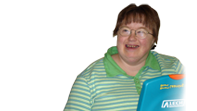Camp Yes And (Indpls): An Improv Summer Camp... Expires 8/31/19
| IN-Indiana Institute on Disability and Community, UCEDD | |||
| Program Type | UCEDD | Fiscal Year | 2020 |
| Contact | Cassandra Cole, EdD | ||
| [email protected] | |||
| Phone | 812-855-6508 | ||
| Project Description | |||
|
Camp Yes And combines communication and social skills instruction for teens with autism as well as deep professional learning for general and special educators, speech-language pathologists, school psychologists, counselors, and social workers (https://yesand.indiana.edu). The camp utilizes innovative instructional methods derived from improvisational theater ("improv"), a form of drama in which plot, character, and setting are created during the moment of performance. Improv provides a safe, supportive, and creative environment for practicing communication and social skills, and it has shown to be effective in strengthening these skills among youth with autism (Corbett et al., 2014; Lerner, Mikami, & Levine, 2010). Strengthening communication and social skills is critical to increasing economic opportunity for youth with autism. In the U.S., nearly 40% of students with disabilities do not graduate high school, and more than 50% of youth with autism do not participate in post-secondary employment or education. Stronger communication and social skills lead to increased graduation rates and improved post-secondary outcomes among teens on the autism spectrum (Laugeson et al., 2012; Shattuck et al., 2014). However, direct service to youth represents a one-sided approach to the problem of school and social failure. Most youth with autism lack cognitive impairments that might prevent them from succeeding in general classroom environments, but fewer than half are included in those classrooms. Many educators do not feel confident in their own abilities to teach students on the spectrum in general education settings (Cassady, 2011). Also, speech-language pathology has moved toward a model in which "a communication impairment is viewed as existing within the relationships between individuals and others in their environment rather than within the individuals themselves" (Burgess and Turkstra, 2010, p. 475), which means that educators need to learn new ways of communicating in order to serve students with autism. Finally, a single educator works with many more tends than can be served directly by camp; each educator that we train has the potential to impact hundreds of teens. For these reasons, our camp combines direct instruction for teens on the spectrum with deep professional learning for educators. Joyce and Showers (2002) found that fewer than 10% of educators implemented new practices after attending traditional professional development workshops, which offered new information and examples, but did not provide practice opportunities in authentic settings. Practice, feedback, and coaching in real-life settings greatly increased the percentage of educators who implemented innovative techniques into their everyday instruction. Our camp enables educators to practice new skills and receive feedback while actually working with the types of youth they serve. During each morning of a five-day camp session, our trainers work alone with educators, teaching them how to use improv to support teens with autism. Each afternoon, we work together to co-facilitate an improv camp for teens with autism. Camp evaluations have found measurable improvements in teens' social communication skills and educators' confidence and skill around supporting students with autism. In 2018, two weeks of camp were held in Indianapolis. Both teen and educator registrations filled quickly and waiting lists were required. |
|||







